Students join forces with Vidius to fight for education
Only downside: 'More students should have spoken'

“Do you agree that there are too many fascists in the Netherlands?” Rapper Benjamin Fro set the tone at the beginning of his performance. He was the first artist to perform at the demonstration against the announced austerity measures for education. The protest started on Monday, November 25, at 1:00 pm at Malieveld. The students affiliated with Vidius were standing at the very back. They looked at each other and grinned as they heard Fro's words. Previous demonstrations had even stronger statements.
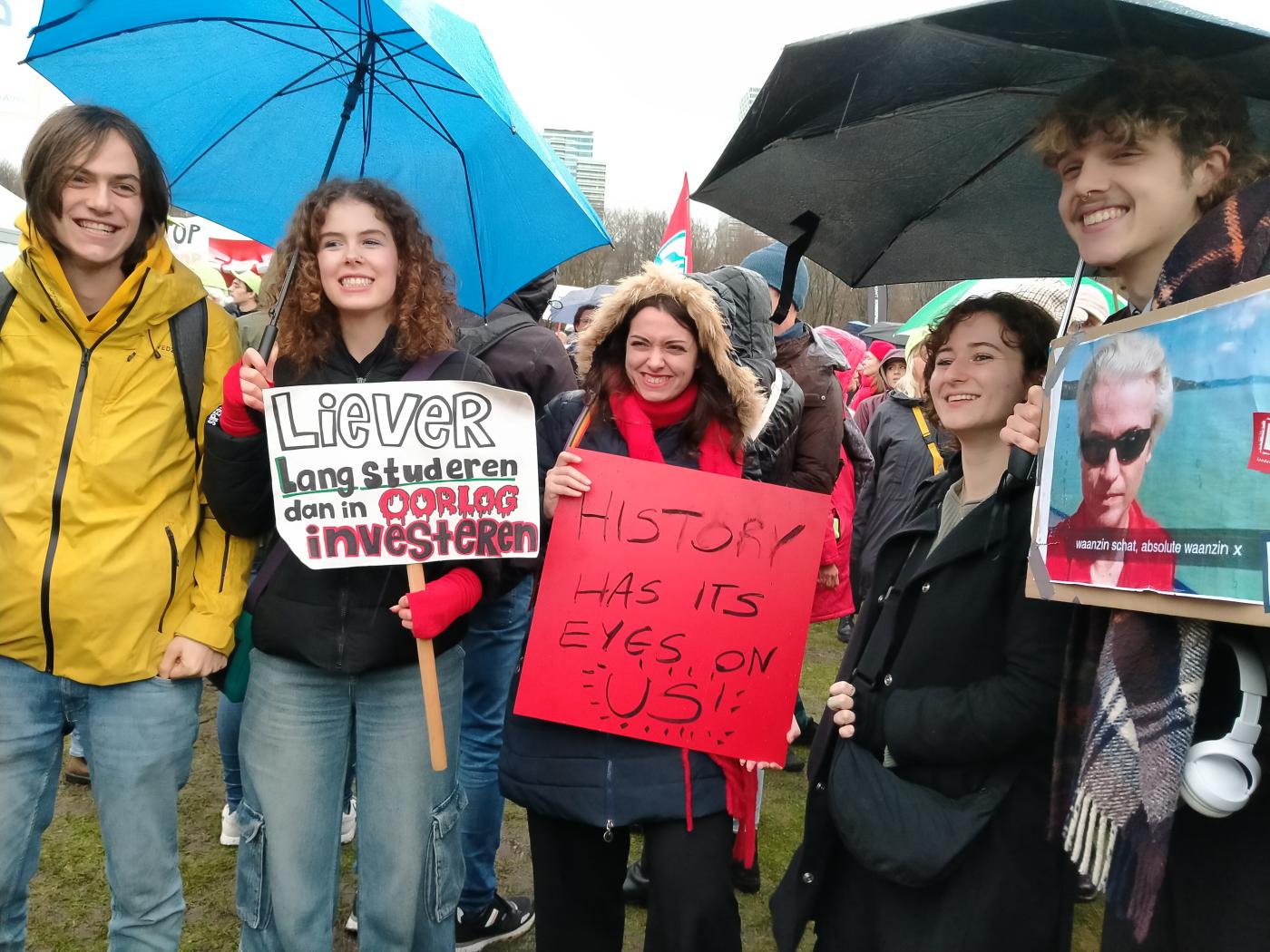
Hermen, Lila, Chiara, Isabella and Marcus. Photo: Samuel de Weerd
Lila is surprised by how many elderly people are there. She has just finished her Bachelor's in Interdisciplinary Social Sciences and wants to attend the Utrecht School of the Arts (HKU) next year. This is her third protest and, so far, she thinks the programme is well-organised. “You can see that this has been organised by teachers and professionals, not by students.”

Young and old fight side by side against the one-billion cut to the higher education budget. Photo: Samuel de Weerd
Lila also attended the protest that happened in Utrecht on November 14. It was supposed to be a big protest just like this one, but it got officially cancelled the day before and students decided to protest anyway. “There were practically only students there. There was no official program and the atmosphere was more radical. It was organised by groups that are more towards the extreme left-wing end of the spectrum and they were the ones who spoke the most. Before that, I went to a protest in The Hague, organised by students, against the fine for students who take longer than one additional year to graduate. We were not welcome and the entire road was blocked by the police, so we could not continue our march. Here everything is running smoothly and properly."
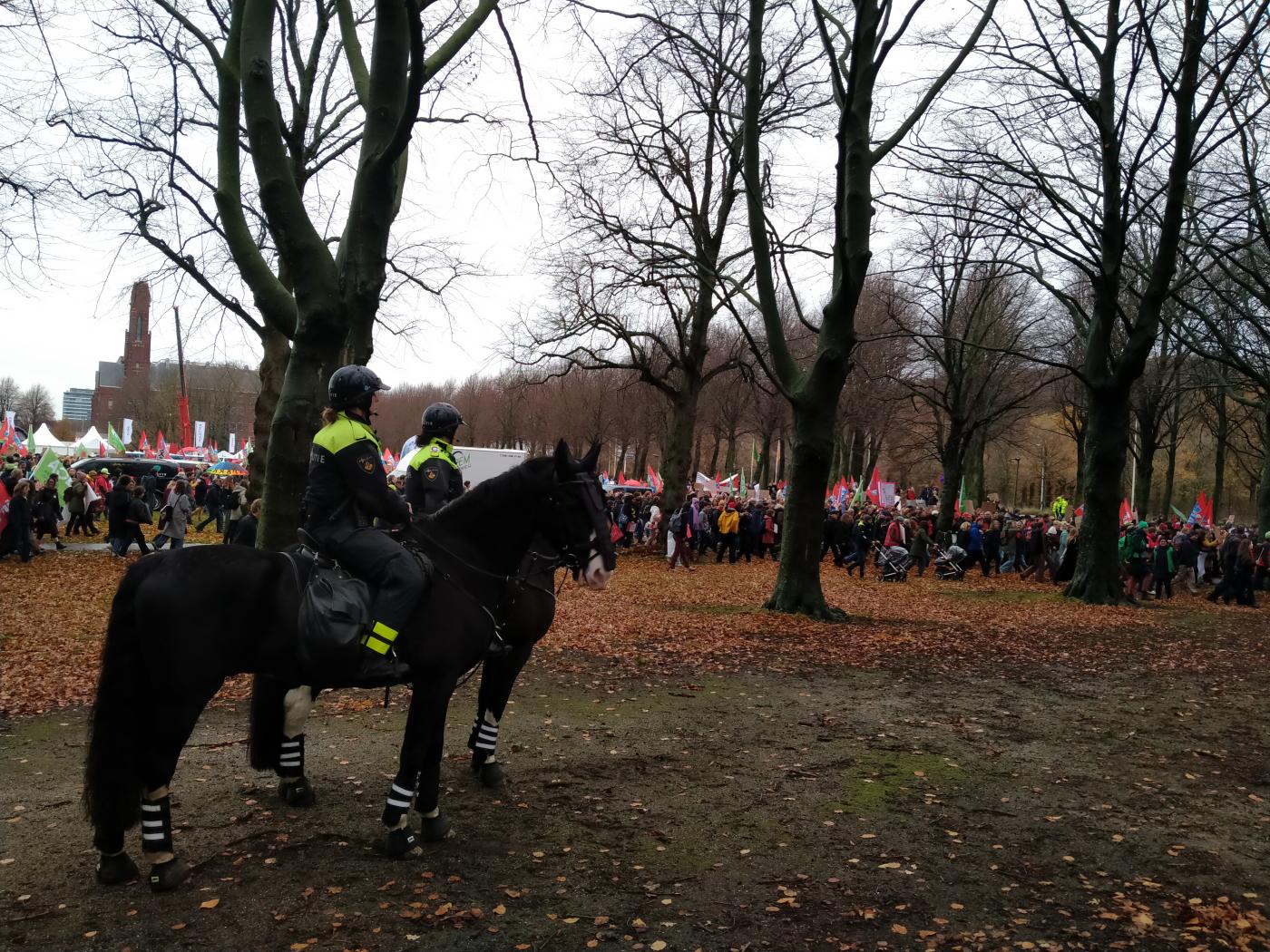
Police horses at Malieveld. Photo: Samuel de Weerd
Everything was indeed well-organised at Malieveld and the atmosphere was relaxed. Upon arrival, gates gave people the impression that they would be frisked, but they soon realised it was a spot where protesters could make signs quickly. There were also toilets, free drinks, and even free fries, which the Vidius students appreciated. "The only thing we miss here is a beer!" jokes Lila.
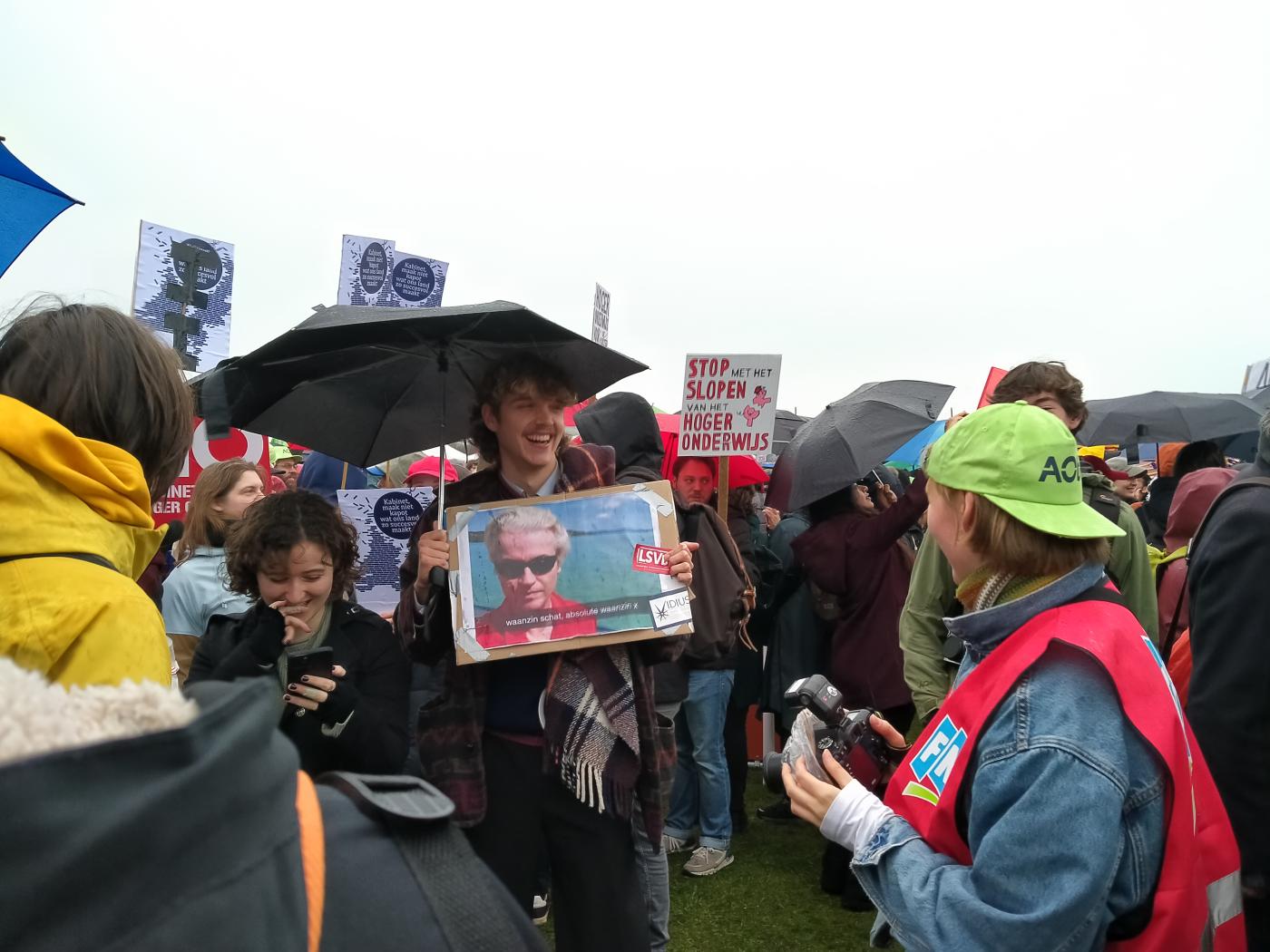
Hermen had the coolest protest sign. Photo: Samuel de Weerd
Hope
Luuk Bruijnen, the student chairing Vidius, was pleased that students and teachers were joining forces to organise such a large protest. However, according to him, there are also downsides to the fact that the protest was organised by teachers and professionals through trade unions and the action group WoinActie. "More students should have spoken," says Luuk. "The speakers told compelling stories, but students' voices could have been represented more. The only students who got onstage in an hour and a half were the ones representing the National Student Union (LSVb)."
Nevertheless, the Vidius group was mostly positive about the programme. "I liked that Sandra Beckerman, from the Socialist Party (SP); Rob Jetten, from the centre-left party D66; and Frans Timmermans, from the left-wing party GroenLinks-PvdA, also made their voices heard," says Isabella, who studies Interdisciplinary Social Sciences. "They get a lot of media attention. That way you know the message is being heard. And the fact that they are standing here together shows that the opposition is united, which is very important in these times. It gives me hope that we can achieve something with this.”

Luuk and Lila shouting along with the crowd. "Don't do it!" Photo: Samuel de Weerd
"Of course, we got the day off"
This is Isabella's first protest. Her classes were cancelled so that students could attend the protest in The Hague. "My programme is not in danger. It's mostly Humanities programmes that will be affected. But everyone knows that the Faculty of Social Sciences could be the next victim."
Chiara, who studies Intercultural Communication, also got the day off. "I had classes in German and Italian today. With the current plans, both of those courses will be cancelled. They gave us the day off so we could come here, of course." Chiara has a Dutch boyfriend and finds it terrible that there seems to be a tendency in the Netherlands to discourage the mixing of cultures. "International students and teachers are increasingly being excluded from the Netherlands. Language studies are being cancelled because they are supposedly no longer important, while they are actually indispensable for the smooth integration of different cultures. That's something essential in this day and age. It is not just about the language. It is about understanding the entire culture of a country and its people. The government is sending a clear xenophobic message through these cutbacks."
Well-being further endangered
Vera's teachers didn't encourage her to come to the protest. She studies nursing. Fortunately, she just happened to have no classes on Monday. “I don’t think my teachers are here today. They are probably far too busy to come. The problem is, the austerity measures will only make that worse. The wellbeing of students and teachers is at risk, and it is already pretty bad right now.”
Due to extracurricular activities, she will graduate one year later than usual. She is a member of a participation council and used to chair a committee. She will probably not be affected by the fine because it will only come into effect later. However, she can imagine how this fine could impact the students who come after her.
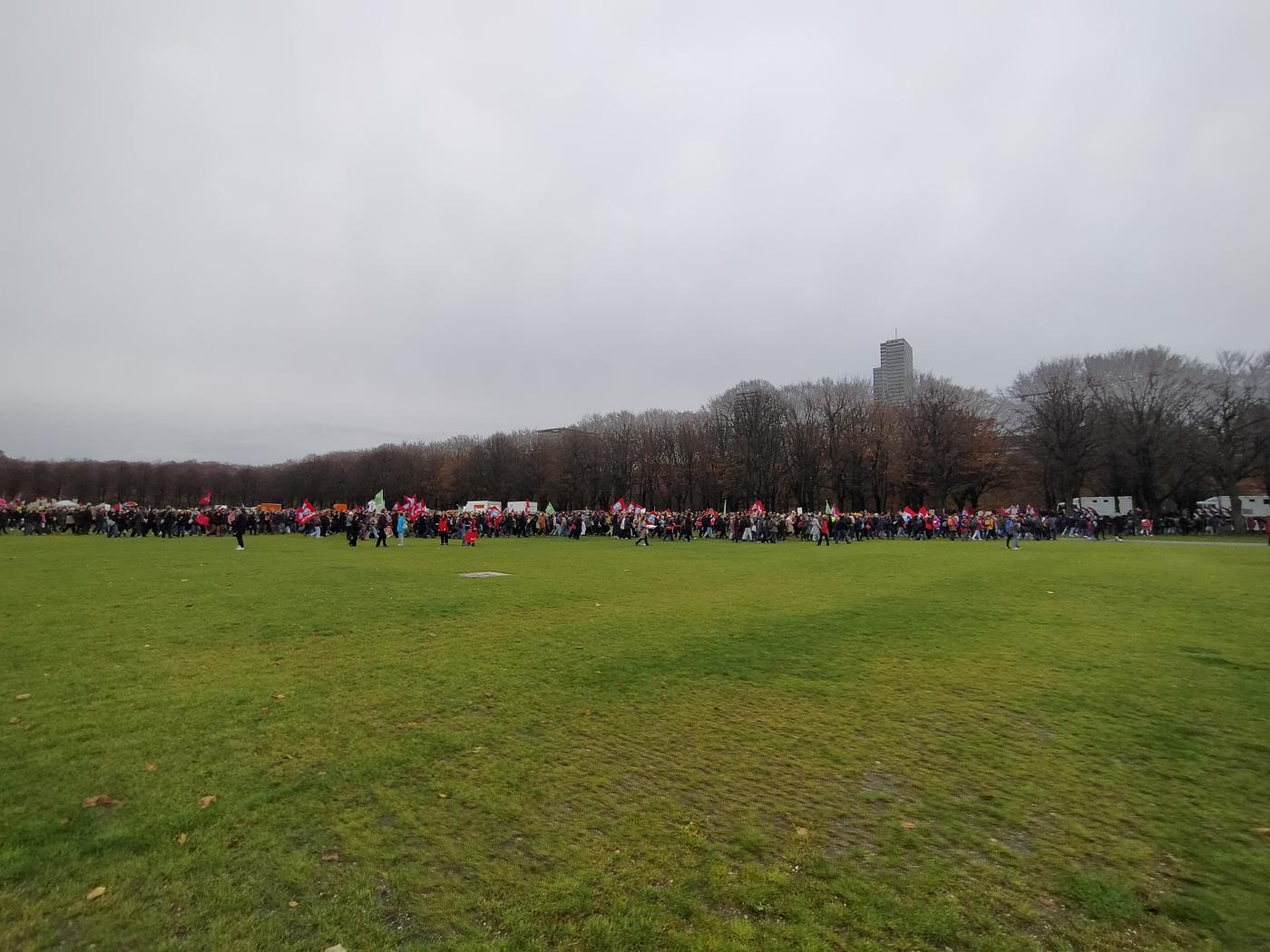
A huge crowd at Malieveld. Photo: Samuel de Weerd
"Everything must be faster and more efficient. But if you join the board of a student or study association, you can't study, even though you must be registered at the university. So, if this fine is introduced, you have to pass everything in one go, otherwise you'll be fined. You can already see that students have trouble doing volunteer work. Student cafes often run on volunteers to keep the prices low. Those cafes on campus are having more and more trouble finding students to volunteer there. The same goes for the Batavieren race, the largest running event for students in the Netherlands, which got cancelled. Soon, nothing will happen at all outside of our studies."
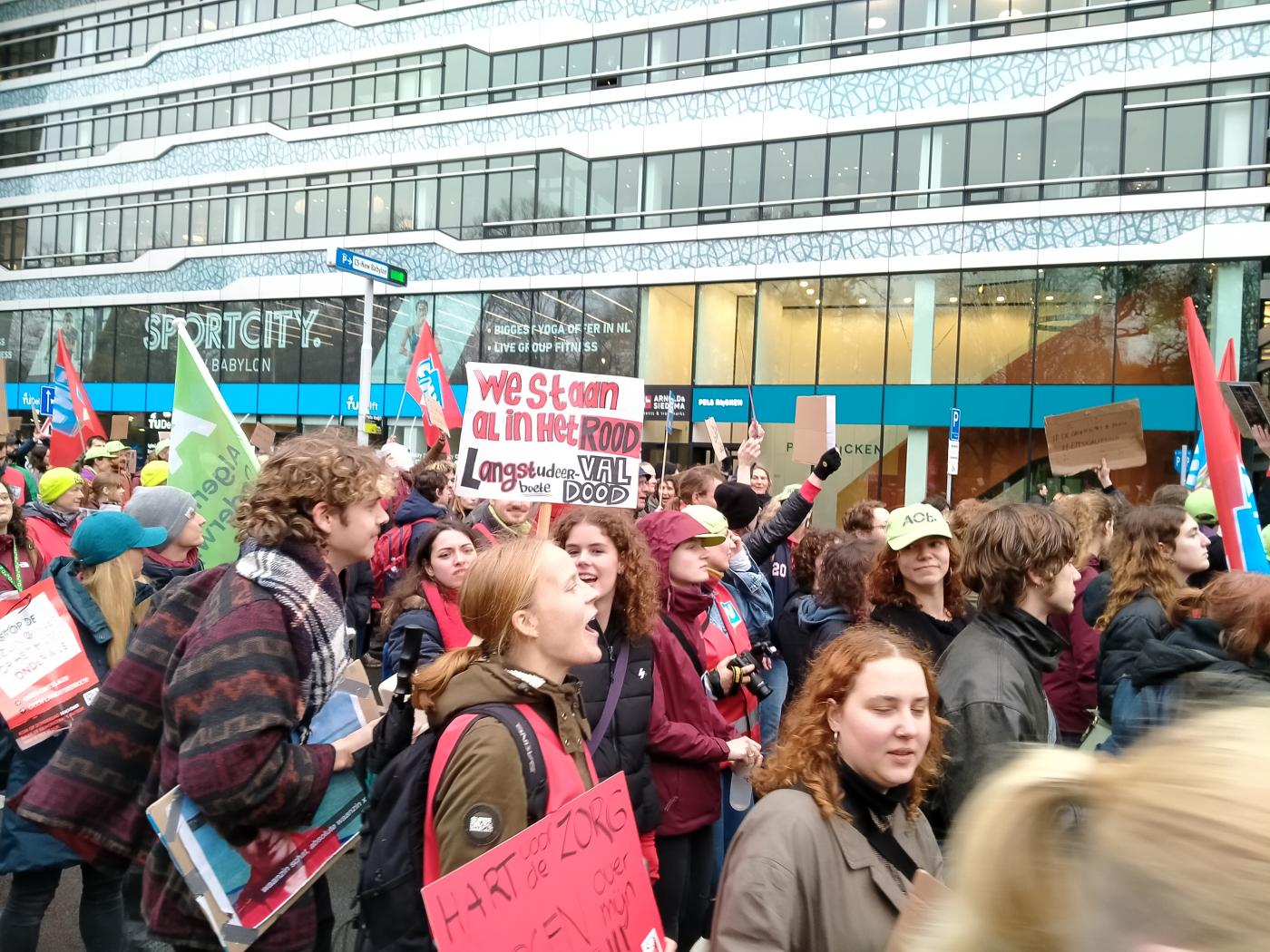
Hermen, Lila and Vera walk with the crowd towards the office tower where the Minister of Education, Eppo Bruins, works. Photo: Samuel de Weerd
Cuts on defense
When asked "Where should the money come from?", most Vidius students have to stop and think for a while. They find it a difficult question and discuss it among themselves. Eventually, they reach a consensus: in their view, defence gets far too much money. The speakers at the protest say the same: according to them, another 37 billion euros will be added to that budget, compared to one billion euros cut from higher education.
“The employment conditions at the Ministry of Defence are extremely good,” says Vera. “Much better than at other employers in the Netherlands. They do that because they have trouble finding people, but there is room for improvement.”
The power of slogans
Luuk is very happy that the slogans, which he devised alongside Vidius' board, are sticking. "Fight, fight, studying is a right" is one of the crowd's favourites. The same goes for "A 3,000-euro fine? Up yours!" After the speakers are done at Malieveld, the thousands of demonstrators walk towards the tower where the Ministry of Education is located. When they arrive there, the crowd is chanting Vidius' battle cries loudly.
According to Luuk, if the cutbacks are not taken off the table, this demonstration will only be the beginning. “Students must start organising themselves locally, within their associations, programmes and their faculties. It starts small, but together they can make a clear fist against the government.”
UU employees were in The Hague too. Six of them showed their protest signs to DUB.